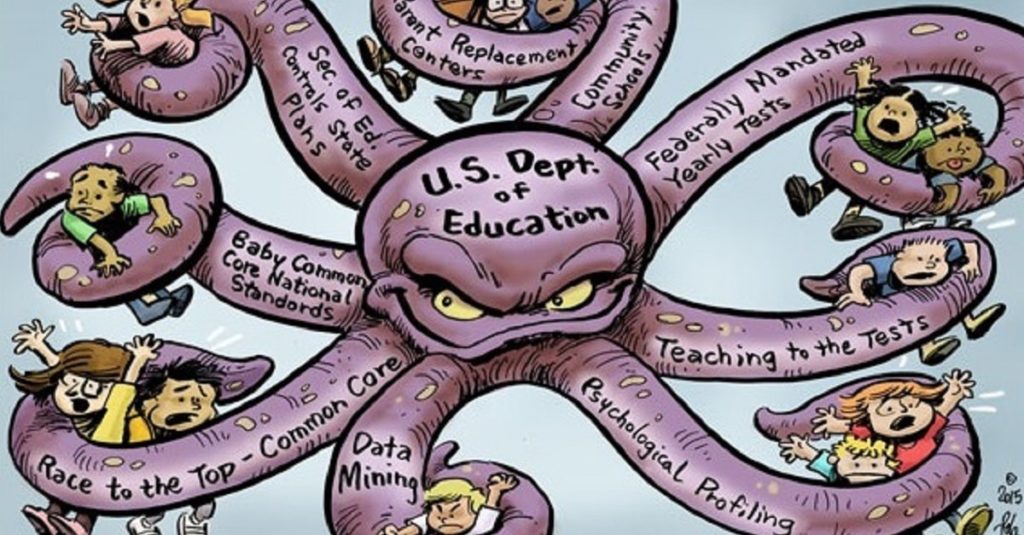Parents Beware: “School Climate Surveys” Pose Many Threats to Students
This article written for The National Pulse by Dr. Karen Effrem takes a look at “School Climate Surveys” which are the tools by which SEL educational learning systems gather data and the problems which these surveys pose for American students.
A recent article by Joy Pullmann in The Federalist demonstrates just how nosy and invasive “school climate surveys” have become. These surveys are now a cornerstone of the implementation of social-emotional learning (SEL) programs in the nation’s public schools and have also been found in Common Core-aligned state tests and (illegally) in the National Assessment of Educational Progress (NAEP).
The surveys make use of extremely vague and subjective questions, such as these examples from the Massachusetts state test:

As noted by Pullmann, another such survey used in the Austin (Texas) Independent School District usurps parental autonomy and asks the particularly invasive and controversial question about gender identity, defining gender as how a person feels about their biological sex:

The problems with these surveys are myriad. Here are just a few:
Asking questions about difficult behavior can actually increase the behavior.
Pullmann interviewed me for The Federalist piece, and one of the major problems I addressed is that survey questions may stimulate thoughts about and increase negative behaviors:
“Yet ‘Whether it’s comprehensive sex education or a survey, if you’re bringing stuff like that [sexuality] up you are potentially creating upset or conflict or just planting the idea’ in young minds that may not be developmentally ready for it, said pediatrician and education researcher Karen Effrem in a phone interview about Austin’s survey. Research suggests that simply asking questions about specific behaviors, such as teen suicide or drug use, increases those behaviors.”
The questions are developmentally inappropriate.
A related problem is that this gender question in the survey was given to third graders — children as young as 8 to 9 years old. Expert psychiatric opinion notes the psychological dangers of raising difficult issues like this with young children who are not developmentally ready to handle it. For example, psychiatrist William McGrath, M.D. said:
“There is a phase of personality development called the latency period, during which the healthy child is not interested in sex. This interval from about the age of five until adolescence serves a very important biological purpose. It affords a child an opportunity to develop his own resources, his beginning physical and mental strength. Premature interest in sex is unnatural and will arrest or distort the development of the personality. Sex education should not be foisted on children. . .”
The the full article can viewed on The National Pulse’s website.
Lawmakers Still Pushing “Personalized Learning” Despite Huge Problems
In this article written for The National Pulse, Dr. Karen Effrem lays out the details regarding the implementation of personalized learning in public education, especially how large tech companies are lobbying the state and federal governments to implement it, despite its problems.
The corporate technology push of machine-based skills training continues to march across the nation. This effort goes by the names such as “competency-based education” (CBE), “personalized learning,” and “mastery education.” It has been well described by Jane Robbins, Peter Greene, here and in this space.
The latest is a bill in Florida that seeks to expand what was supposed to be a five-year pilot project for four school districts and the University of Florida experimental school to all 67 Florida school districts after only two and a half years. This expansion is problematic, not only because of an absence of data showing its effectiveness in any of the pilot counties, but also because of the clear evidence that it failed in Lake County, one of the original pilot districts. Lake County experienced a significant drop in graduation rates, and the grade for the high school implementing the pilot dropped from a B to a D.
Bill Gates, who was funding Lake County’s CBE effort before it failed, has admitted that education technology has not improved academic performance in general. It should be noted that just about every Gates education venture has been a failure. In addition to Common Core and CBE, the teacher evaluation grants in Hillsborough County, Fla., cost that county’s taxpayers an extra $24 million and were a total failure. Even the smaller school-to-work learning communities which preceded Common Core also failed.
Parents, initially quite enthusiastic about the advertised glories of CBE, have quickly learned in most instances that these promises have all the substance of cotton candy in the rain. For example, 73 percent of middle school parents in the MacPherson, Kan., school district stated in a survey that they would prefer their students not be in a class using Summit Basecamp personalized learning (CBE) digital learning platform due to academic, privacy, physiological and psychological concerns. Parents in Cheshire, Conn., and Indiana, Pa., have been able to stop the use of the Summit in their school districts due to concerns about academic achievement and data privacy.
The Summit Basecamp platform is a joint venture between the Summit charter schools and the Chan-Zuckerburg Initiative founded by Facebook CEO Mark Zuckerburg and his wife Priscilla Chan. There are many other instances of parental anger and removal of their children from schools using this platform, well explained by Leonie Haimson of the Parent Coalition for Student Privacy. Interestingly, Summit boasts of a research collaboration with Harvard, but refused to be studied by Harvard researchers.
Data collection, including psychological data, in CBE is extensive, with the FBI issuing public service announcements warning of the privacy dangers related to education technology. One education technology company called Knewton brags about being able to collect 5-10 million actionable data points per student per day as they interact with Common Core curriculum and embedded assessments, and another called Dream Box boasts of collecting 100,000 data points per student per hour. These are the kinds of platforms commonly used in CBE.
The full article can be viewed at The National Pulse’s website.
New Report: 50 Years of ‘Fed Ed’ Has Failed to Close Achievement Gap
This article written by Dr. Karen Effrem for The National Pulse details the failings of the U.S. federal education system to raise the academic performance for underprivileged students.
A History of Fed Ed: From ESEA to Common Core
That federal interference started with the Elementary and Secondary Education Act (ESEA), which began compensatory grants for poor children in K-12, and Head Start, the federal preschool program, both passed in 1965. Both laws, plus the General Education Provisions Act (GEPA), started out relatively benignly with all sorts of comforting language about how the federal government was not going to interfere in local autonomy regarding curriculum, etc.
However, both federal education laws have gradually increased the iron grip of federal control over states and school districts over the last fifty years. These three statutory provisions protecting local control have essentially been ignored.
First, the feds imposed statewide standards and tests on states as a prerequisite for federal funds in the 1994 reauthorization of ESEA, called the Improving America’s Schools Act. Not only did they take away school district autonomy in choosing standards and tests, but they also required those standards to comply with the federal Goals 2000 standards. Goals 2000 was an intensification of federal control of both state and federal pre-K programs that had to comply with Head Start — and also marked the first time that “social emotional learning” appeared in the federal education lexicon.
Then came the 2001 version of ESEA, called the No Child Left Behind Act (NCLB). It ratcheted up federal control even more by requiring statewide tests in math and English/reading every year in grades 3-8 and science once in elementary, middle, and high school. SEL and preschool elements from the 1994 bill also survived in the new version. However, the worst part of NCLB was the completely unrealistic 100-percent proficiency requirement in math and English by 2014 for every subgroup under the threat of districts losing federal funding.
Years later, the Obama administration then used that threat plus the Great Recession to bribe/coerce states into adopting Common Core via illegal waivers and the Race to the Top grant program, all well explained in the white paper by Robert Eitel and Kent Talbert: “The Road to a National Curriculum — The Legal Aspects of the Common Core Standards, Race to the Top, and Conditional Waivers.”
The rest of the article can be viewed on The National Pulse’s website.
Common Core & SEL Architect Linda Darling Hammond to Lead CA State Board of Ed
In this article for The National Pulse, Dr. Karen Effrem describes the current state of the California education system, and how it’s new appointed head, Linda Darling-Hammond, is continuing to roll out faulty education policies state-wide.
While Governor Ron DeSantis is taking Florida away from Common Core, California Governor Gavin Newsom is bitterly clinging to the failed standards and pushing that state farther into the fuzzy, unscientific, invasive social-emotional learning (SEL) as well. Newsom appointed radical Stanford professor emerita Linda Darling-Hammond to lead the California State Board of Education.
Hammond, as you may remember, was terrorist and close Obama friend, Professor Bill Ayers’ choice for secretary of education during the first Obama administration. Hammond served as an education adviser and transition team leader in 2008. When Arne Duncan was chosen instead and took on the role of bribing/coercing 45 cash-strapped states to accept the Common Core standards during the Great Recession, Hammond got to work developing and implementing the Smarter Balance Assessment Consortium (SBAC) national Common Core assessment.
SBAC started out with 24 states plus the U.S. Virgin Islands and have now decreased to 13 states plus the U.S.V.I. However, some of the states formerly in SBAC like Utah and West Virginia have gone on to adopt the American Institutes for Research (AIR) test, which admits in it contract with Florida that it also develops the computer adaptive testing platform for SBAC, so it is likely that the two tests are quite similar, at least in format. AIR admits on its website that it “delivered online tests for 19 states and had contracts with 22 states in 2015-16” but does not list which states use their tests. It is also important to note that AIR describes itself as “one of the world’s largest behavioral and social science research and evaluation organizations.”
The reason it is important to understand the connections between Common Core, AIR, SBAC and Linda Darling-Hammond is that she also is an extremely strong proponent of non-academic issues like “equity”and SEL. She believes that the U.S. has “one of the most unequal educational systems in the industrialized world.” Hammond serves on the board of the Collaborative for Academic, Social, and Emotional Learning (CASEL), the godfather of SEL in the U.S. and co-chaired the Aspen Institute’s National Commission on Social, Emotional and Academic Learning that just completed their final report that is loaded with problems and contradictions.
These problems include:
Lack of scientific and research support – the interim commission report on the brain science of SEL co-authored by Hammond had numerous problems
Strong links between SEL and Common Core, despite the fact that proponents promised that the standards were academic and rigorous
Repeated promises that SEL in schools will be a local effort while publishing an interim report that lists over 100 federal programs in eight different federal departments and agencies that can be leveraged to fund SEL
Despite the Commission and “grit” guru, Dr. Angela Duckworth, stating that SEL parameters and school climate surveys should not be used to judge students, teachers, and schools for accountability purposes, California has been piloting an effort to do just that among a large consortium of districts over the past several years. With her strong SEL involvement, will Hammond heed the Commission and stop that effort or will she find a reason to continue the subjective and invasive data collection involved?
Hammond is also a strong proponent of the ineffective and dangerous Obama-era school discipline policy that has been so wisely rescinded by the Trump administration. This policy is also being rejected in Florida, where Arne Duncan mentee from the Chicago school district, Robert Runcie implemented the idea in the Broward County Public school district. This failure to maintain discipline and heed clear warning signals from a very troubled former student are felt to be large contributing factors in the tragic massacre of 17 innocent people at the Marjorie Stoneman Douglas High School one year ago. Some of the many legal, policy, and safety flaws with that guidance are discussed here.
Finally, Hammond was the co-founder of two Palo Alto charter schools that were dismal failures academically as described by Donna Garner at Education Views based on local reports. This does not inspire confidence for the future of California’s public schools.
Although it is tragic for California students, the contrast between failed philosophies espoused by Linda Darling Hammond and the efforts of Governor DeSantis to listen to parents and get rid of Common Core could not be clearer. Let us work to make the Florida efforts so successful that it inspires an even stronger parent rebellion in California that sets those poor children free.
The full article can be viewed on The National Pulse’s website.
Issues
- Assessments + Testing (25)
- Bullying/Sex Education (6)
- Child Protection League (2)
- Common Core Standards (78)
- Curriculum + Standards (65)
- Data Collection and Data Privacy (64)
- Early Education/Nanny State (75)
- Federal Education (128)
- International Education (6)
- LGBT Issues in Education (9)
- Media Appearances (4)
- PL/CBE (2)
- Planned Economy (11)
- Politics of Education (26)
- School Violence (9)
- Social Emotional Learning/Mental Health (52)
- State Education (89)
- Testimony/Presentations (17)
- Uncategorized (13)
- Unions (10)
Education Liberty Watch Projects
ELW Allies
- American Principles Project
- Cato Institute
- Conservative Teachers of America
- Constitutional Coalition
- Eagle Forum
- Minnesota Advocates and Champions for Children
- Missouri Education Watchdog
- Restore Oklahoma Parent Empowerment
- Stop Common Core
- The Pioneer Institute
- Truth in American Education
- What is Common Core – Education Without Representation




